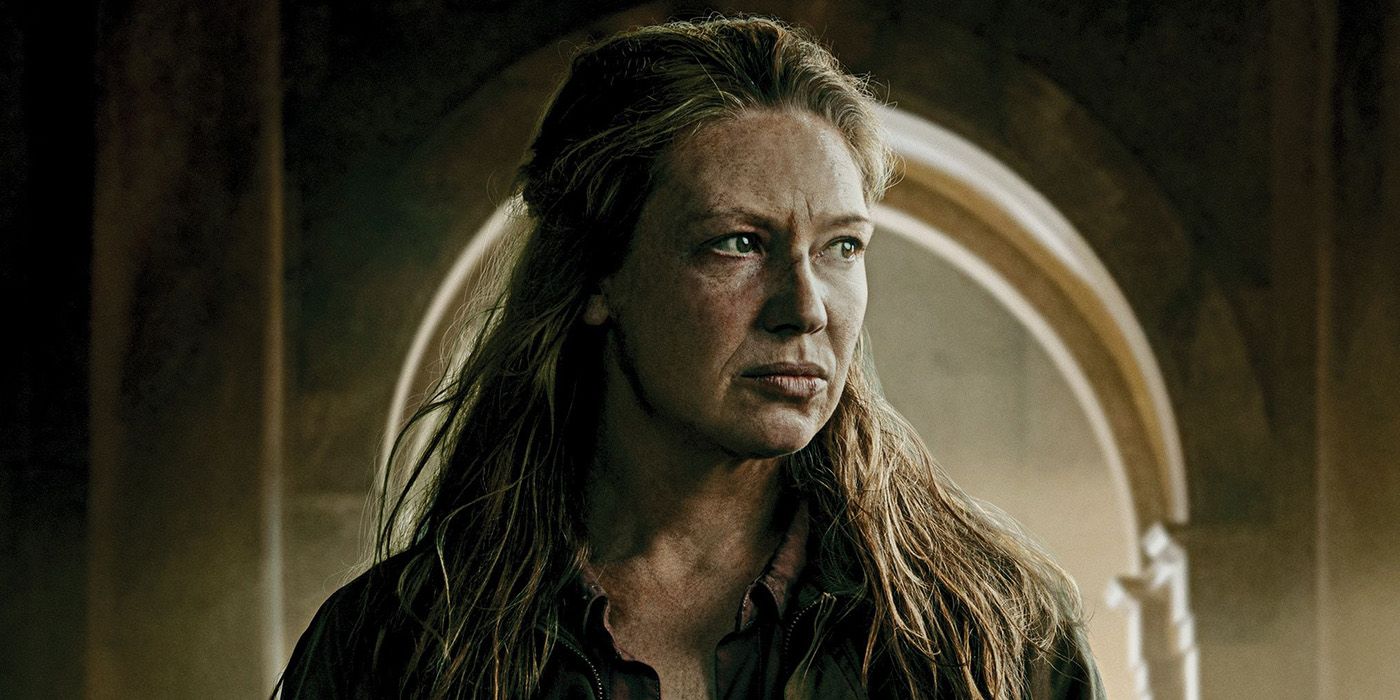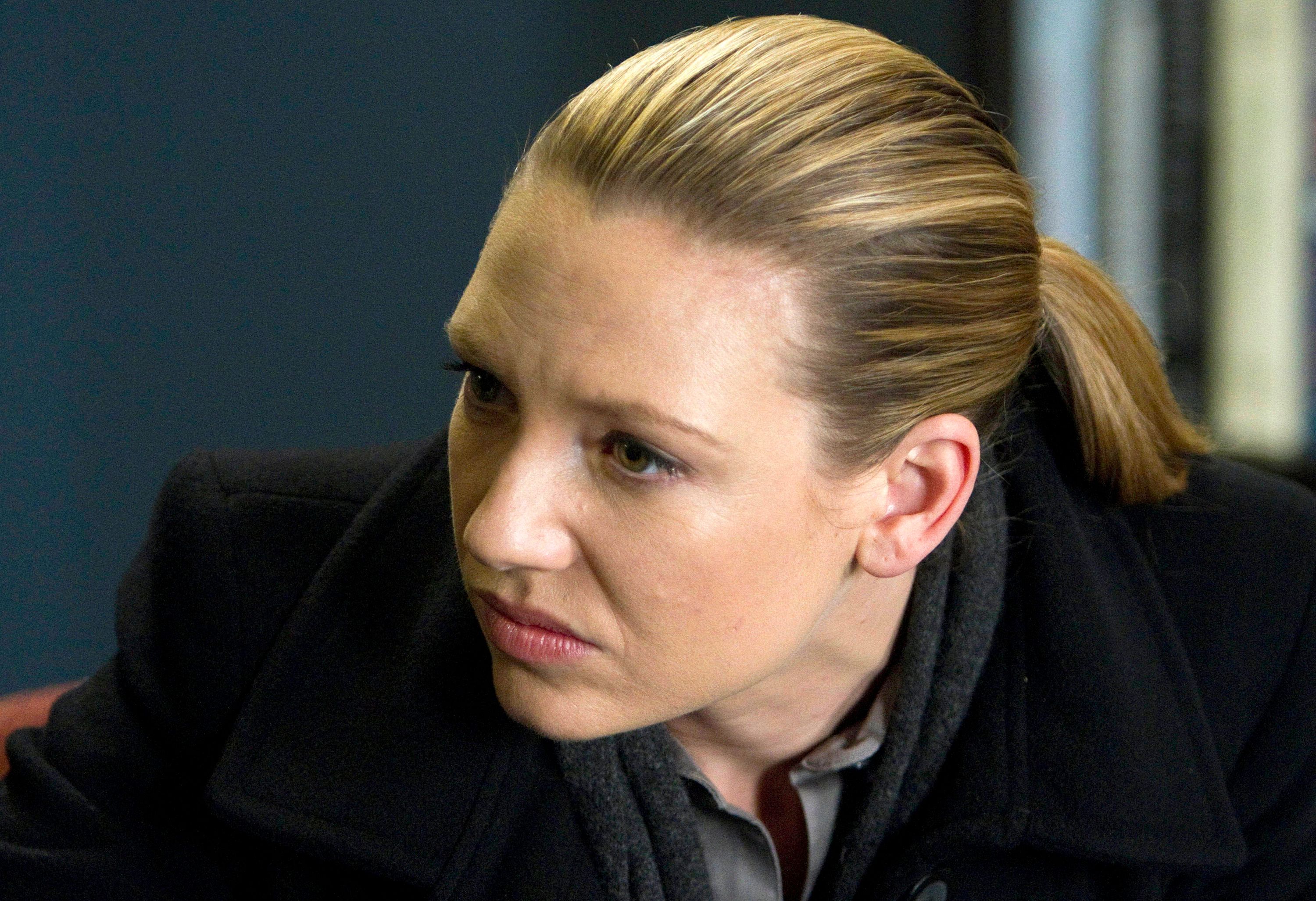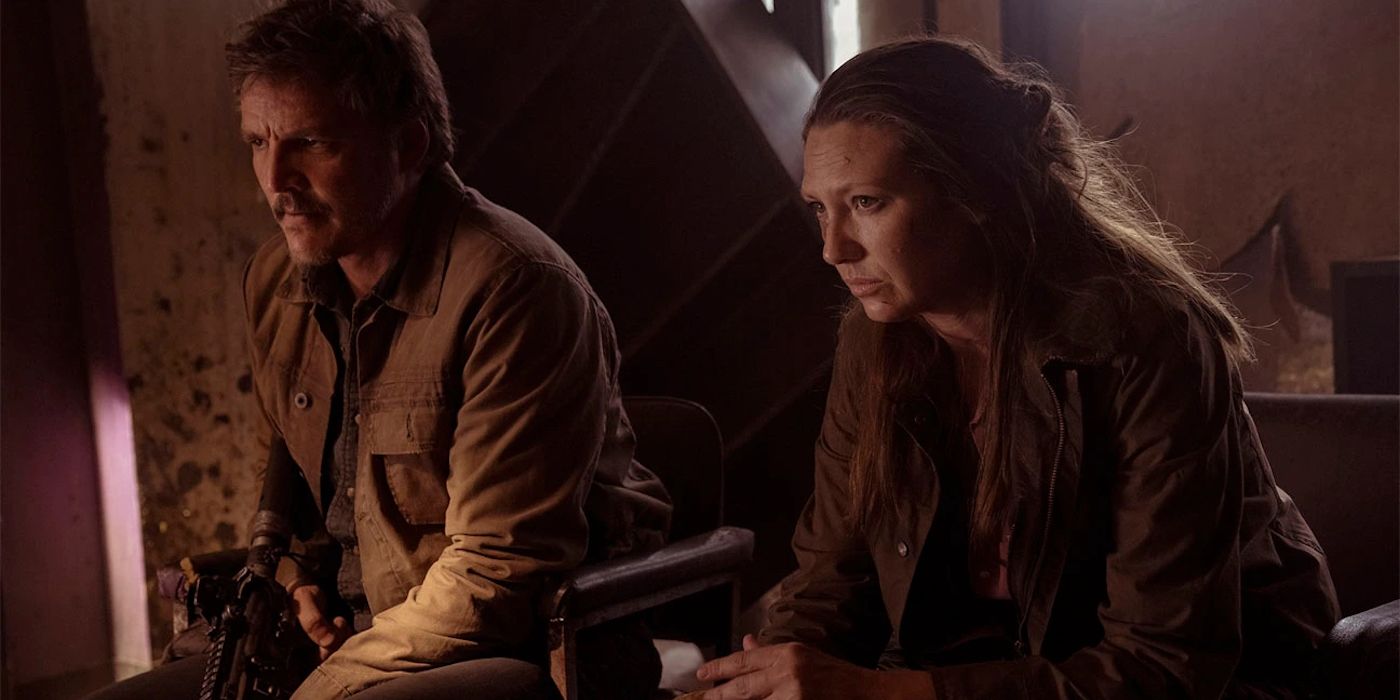Editor's Note: The following contains spoilers for The Last of Us.
Tess (Anna Torv) is looking worse for wear. An ugly bruise that desperately needs icing, keeps one eye barely open. Two men who did the beating stand nearby while a back-stabbing smuggler sits in front of her. She’s outnumbered, yet it’s the smuggler who’s freaking out. He’s nervous of the repercussions for the attack, practically begging to not get Joel (Pedro Pascal) sent after him. Tess owns this forced sit down, leaning back in her chair and looking miffed. “Now your shit has pretty much ruined my week, and I’d like to go home and drink ‘til my face stops hurting. So, are we good?” she demands. It’s a hell of an intro, setting up who Tess is: a quick-thinking, calm-headed survivor.
Torv is awesome, making a big impression with limited screen time. That she doesn’t make it past Episode 2 is a reminder of two previous roles. In Fringe, an underrated series that deserved more mainstream love, she saves the world countless times. In Mindhunter, a third season on hold indefinitely, her character researches imprisoned killers to better understand them. For all Anna Torv can do with a guest star credit on The Last of Us, she pulls out all the stops when she’s a lead.
Apparently, All Paths Lead Back To Boston
Before it was a dystopian city, Fringe’s Boston was home to FBI agent Olivia Dunham (Torv). Olivia is dedicated to protecting innocent lives, teaming up with the brilliant but unstable Dr. Walter Bishop (John Noble) and his estranged son Peter (Joshua Jackson) to investigate strange, science-based attacks. The first batch of episodes are a little wobbly in figuring out who Olivia is. Up to this point, an uptight demeanor made her a tough nut to crack. “Bound,” an episode halfway through Season 1, reshapes her into a better, complex character. To do so, it throws everything it can at her. A kidnapping attempt forces Olivia to fight for her life. On the opposite end, a sister and niece visit, allowing a lighter side to Olivia to show itself. Still, it’s always a pleasure to see her taking no bullshit from anyone. When a man attempts to analyze her by describing what is on her nightstand, he imagines a Bon Appétit issue of the month. She smirks, replying, “I’m reading Advanced Forensic Science by Annemann. I keep it next to my gun.”
The Cordyceps infection in The Last of Us is horrific, taking control over the host’s body to grotesque transformations. In Season 2 of Fringe, “What Lies Below” introduces a virus that craves further contamination. The veins of victims spray blood and can manipulate a host into escaping a quarantined area by any means necessary. Olivia and Peter get trapped within this outbreak, as the only plan the CDC usually rolls out in movies and TV — to eradicate the location. The true "Torv de force" performance is when the actress portrays a doppelgänger. Fringe’s main mythology involves a parallel universe, giving Torv the chance to play an Olivia that is a stranger to audiences. Named Fauxlivia to differentiate the two, this one dresses and acts like a superstar soldier, fit with swagger and a carefree personality. In seeing what could have been, it challenges prime-universe Olivia, who's closed-off and self-critical. As the series progresses, it's fulfilling to watch her build trust with others and realize the pressure of saving the world need not rest exclusively on her shoulders.
Save Who You Can Save
In Mindhunter, Dr. Wendy Carr (Torv) is a psychology professor in Boston. It isn’t long until she leaves, choosing to not reach tenure in order to commit to helping two FBI agents research serial killers. This is before the term “serial killer” was even invented. In creating the Behavioral Science Unit, what if criminal profiling can help prevent future killings? It proves tricky and possibly inconclusive, especially because the BTK Killer lingers along each episode’s margins, remaining without detection. While Dr. Carr is at a distance from these incarcerated violent men, agents Holden (Jonathan Groff) and Tench (Holt McCallany) are the ones who travel to interview them. Sitting down, she hits play on the recordings and listens to the disturbing playback. Unfazed by it all, this catches up with Carr, who has to deal with Holden’s reckless ego and workplace gender discrimination.
In a fun nod, there’s a reunion of sorts among actor Michael Cerveris and Torv. In Fringe, he plays a long-running side character known as The Observer. Bald and emotionless, this mysterious man in a suit quietly watches major events go down. Cerveris’ role on Mindhunter has him out for his own interests. Ted Gunn is the new Unit Chief overlooking the BSU and Wendy is unsure about his intentions, especially due to his adoration for Holden’s instincts. Instincts, mind you, that nearly get the program shut down when Holden uses a derogatory slur against women to “help” an incarcerated killer open up. Wendy gives him the cold shoulder, along with a face of disgust. There’s another issue with Gunn. After Wendy conducts her own interview with a subject, Gunn isn’t impressed. Using careful, deflating words, he demands she stay back in the office.
In Season 2 when she decides to date a local bartender, we see how awkward Wendy can be outside her work. Kay (Lauren Glazier) is a free spirit, at odds with rigid Wendy. A date at the cinema means they must arrive in time to get popcorn and catch all the trailers. An inability between both women to properly communicate ends this fling. Both are in the closet in very different areas of their lives. They could work this out, except Dr. Carr brutally ends it, throwing a low blow by insulting Kay’s job. For all of Wendy’s degrees in psychology, a keen eye and ear for understanding human behavior, she shuts Kay out.
Finding Hope After Doomsday
Traveling ahead into post-apocalyptic Boston, a journey outside the quarantine zone was always going to be risky. In Episode 2 of The Last of Us, Tess journeys out of the quarantine zone with Joel and Ellie (Bella Ramsey), and it ends in tragedy. Taking in the city’s destruction, Tess decides on the best route to move forward. Well, really the only route: “It’s the long way or the ‘we’re fucking dead’ way.” Never mind the bleakness, Tess’ optimism rises when she realizes Ellie is immune from the Cordyceps infection. What if the girl can bring about some good? What if Tess can have a hand in that? Olivia finds strength in opening up to loved ones. Wendy protects herself by keeping everyone at a distance. Tess blends what makes these past characters tick. She has deep feelings for Joel, spooning him in bed and calming him down when agitated. But these feelings aren’t reciprocated. All of this makes the final minutes sting.
An intense encounter with Clickers leaves Tess infected. She knows how special Ellie is and Joel is now the only one who can protect her. “I never ask you for anything, not to feel the way I felt,” she tells him. If Wendy’s last words to Kay were meant to hurt, the last exchange between Tess and Joel is to fuel him forward. She doesn't insinuate it, but it's clear on his face there is guilt on his part for keeping the relationship so one-sided. Props to Tess, she’s a strategist to the end, figuring out how to make her death count. Paralyzed and forced into a death kiss, Tess keeps on flicking a lighter until it ignites a fiery ball. If she goes, she’s taking out as many of the infected bastards as she can.
Olivia, Wendy, and Tess all show the powerful and nuanced performer Anna Torv is. She has done more recent projects; the political thriller Secret City and journalism drama The Newsreader brings the actress back to her home roots in Australia. Could we have gotten one more episode with Tess? Just one more, enough to keep Anna Torv on for a little while longer. It’s another goodbye for now, although perhaps a future project will place her into yet another iteration of Boston. Could that happen or is three times enough? Remembering Fringe’s tagline, there are "endless impossibilities."




